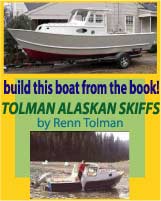Expanding the Notion
 |
Shemaya, Dave and Anke soon to embark.
Photo Credit Bob Hicks |
In The Non-Macho Sailor, Katie Burke reminds us that the forces we sailors face dwarf our human scale. We can each of us - no matter our skill or physical ability - be overwhelmed by the merest shrug of wind or sea. Our minds numb with cold or fatigue. Our bodies famish with hunger or thirst.
But we are not helpless. We clothe ourselves to retain the precious heat of our bodies. We amplify our strength with simple machines - the lever, block and tackle, the wedge. With friction - turn upon turn - we bind and harness the wind's power. Our vessel is scaled, built and refined to extend the strengths of her crew and shield their weaknesses. She must carry us safely through the range of conditions her purpose demands.
At any given moment, we are each of us constrained by limitations. So many of us share nearly the same set that we often fail to see them as such, taking both strength and weakness for granted. We're all able bodied seafolk, here... right?
Well, that brings me to our friend, Shemaya.
***
Ye Vessel: S/V AUKLET ex Phil Bolger CHEBACCO... 20ft x 6ft x 2ft, 'glass-house' variant, rigged cat-yawl with a snug Layden Lug main (designed by Matt Layden for such small cruisers as his PARADOX, it furls around a rolling boom) and sprit-boomed mizzen. A Torquedo electric motor (charged via solar panel) provides a window of propulsion.
Ye Crew: Anke and myself, a pair of live-aboard fringe-dwellers from SE Alaska. Drawn out of our shell to New England for a wedding, we leapt at this chance to sail with our friend and...
La Capitaine: Shemaya Laurel. We joined her for a short leg (Gloucester to Plymouth, Massachusetts) of her much larger, single-handed journey, which had extended as far north as Penobscot, Maine.
Ye Support Crew: Shemaya's voyage is supported, landside, by a team who handles supply and transportation issues. Anke and I benefited from their hospitality and friendship before and after our part of the trip.
Anke and I sailed with Shemaya across five days and four nights. We enjoyed meeting Suzanne Altenberger and Bob and Jane Hicks. We had wind on the nose, on the beam and abaft. We anchored and docked. We had a beautiful night sail past Boston under a full moon. Sub-urban sailing was new and exciting to us - dazzling, with myriad lights. We scampered across busy traffic lanes. We saw birds and boats we'd only ever seen in pictures. Accommodations were snug but ample. A wonderful time enjoyed by all.
Blah, blah, blah.
No offense intended to anyone, but this kind of story bores me, third hand. Great fun in person, and I enjoy such yarns, spinnin' or spun in person (interactively) with most anyone. But unless I personally know at least some of the people involved, I seldom read one. Nor do I feel inspired to write it up.
There is something special about this story, though, which seems worth sharing.
Shemaya is constrained by a chronic condition which severely limits her mobility, physical strength and stamina. Chemical and food sensitivities impact her diet, routines and social contacts. Routine tasks of a sailor - anchor set and haul, sail raising, reefing and handing, watch-keeping and all the rest - are managed with a body whose force must be mustered and rationed. Her energies can be precipitously drained by exertion. Every motion must be carefully planned and executed with the greatest care and economy.
All this with none other to tail a line or heave a pawl, pass a mug up or relieve the watch. All this with style, grace and - especially - graciousness. It takes a lot of that to interact with those of us who are generally considered to be 'able bodied'. We (well, I should speak for myself)... I arrive laden with ignorance, compassion (a fine line, there, beyond which can lie unintended condescension), good intentions, ill-fitting habits and assumptions.
Meanwhile, Shemaya has her vessel in hand. The boat and it's every function has been scaled and adapted to her range of ability. She has sailed, this summer, over many miles of busy and challenging waters, with no more excitement than anyone would expect on such a voyage. Her seamanship is competent and business-like. Her stories lack the luster of danger or daring-do. She has tooled up in accordance with her constraints, and then simply gone sailing.
It turns out that the 'challenged' ones aboard were Anke and myself! Shemaya has her world in order; every routine is... well... routine. It was we who were a bit awkward and out-of-place within it. But Shemaya is a gracious host and patient teacher. With kindness and tolerance, she brought us into easy harmony aboard AUKLET.
And this launches a conversation.
*****
There's something I've been learning is endured by people who go out and do what they want to do in the face of greater than usual constraints; they are told, "You are an INSPIRATION [Amazing. Astonishing. Phenomenal. Et Cetera. But especially 'an Inspiration.']"
One might think it a fine compliment. This has been my own tendency until this trip, through which Shemaya is helping me toward a paradigm shift.
Trouble is, 'compliments' of this sort often carry baggage in the form of underlying assumptions and attitudes. They often establish a pedestal, then plant the recipient firmly upon it. Personhood is easily lost in a sort of statuary; respect marbled with pity. From this point on, everything is seen through the lens of disability. The most banal action becomes special. An achievement. Against such a background, how can true achievement be discerned?
For example, Lord Nelson is remembered for his naval tactics and ferocity, not because he had lost an arm. He was not exceptional because of his condition, or even in spite of it. The loss of a limb is a mere footnote to an independently exceptional life.
Being labeled an Inspiration can give rise to the feeling, from without and/or within, that there is something - anything - to prove. To live up to. That one is and must continue to be an Inspiration with a capital 'I', rather than simply one's self.
Meanwhile, the process of working out of a vessel's details to fit her crew's needs and abilities is exactly the same for all of us. We inventory our strengths and limitations, all of which fall along a spectrum. Ideally, our vessels become as unique to ourselves as the shell of a mollusk, in perfect harmony with our needs. In all cases, a boat's detail will favor this or that solution. The further from 'the norm' one fares, to be sure - to the antipodes of body, soul or the planet - the more research and ingenuity are required.
The notion of independence is one we, as sailors, cherish. Yet we all of us rely on networks to supplement our abilities and interests. Whether via a piece of wood, metal, cloth, plastic or food item, we all engage vast and largely unacknowledged networks of persons who reap, refine, transport and market the goods we employ. Even in our support networks - reimbursed or not - we tailor their extent and the services they provide to our unique needs. Our vessels do not float on water alone.
Tristan Jones didn't become any less of a seaman (nor rascal, for that matter) for the loss of his legs. He chose a broad, stable platform (trimaran), equipped it with hoists and specialized gear and recruited a crew able and willing to work with him. He merely arranged a different set of solutions on his way to the horizon.
As an illustrative thought experiment, try this out: Is being 'short' (altitudinally challenged, if you prefer) a handicap to overcome? Are achievements by short persons inspirational because they are short? Did Napoleon Bonaparte do pretty well for a short person? Did he conquer his empire? He and what army? What tools did his army use, and who provided those?
So I'm expanding my notions of what it means to be able-bodied. I'm learning to decapitalize the 'I' in inspiration - to the level I'd afford any of my ingenious and intrepid friends who are out living their dreams.
And yet, this conversation is only beginning. Somewhere in me is still a deep acknowledgement of obstacles overcome. A gut feeling that dues are inherent to the best of the Blues; that greatness is rare in the absence of struggle. That achievement is, at least in some measure, relative to the cost.
Helen Keller's story still seems more to me than yet another story of a spoiled child who matured into a deep and worthwhile person.
Shemaya's voyage still seems more to me than just a summer's cruise.
 |
Anke trying out the Packraft, tender to AUKLET.
Photo Credit Shemaya Laurel |
sailingauklet.com
|







